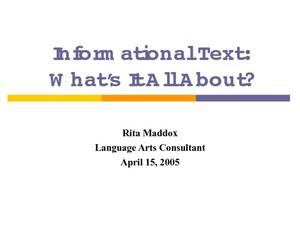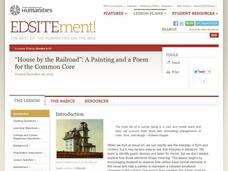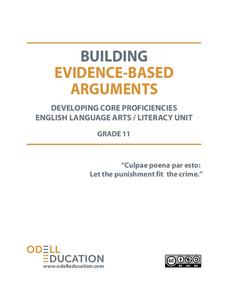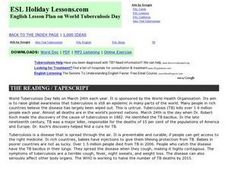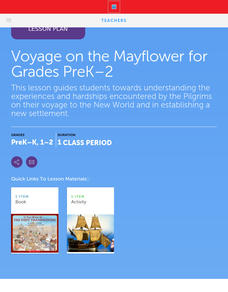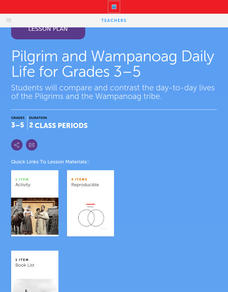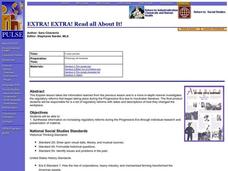EngageNY
Synthesizing from Informational Texts: Main Idea and Key Details from Promises to Keep (Pages 8– 10)
Learners determine the main idea of a timeline on pages eight and nine of the text Promises to Keep. They use the timeline to complete a Main Idea and Details note catcher and then share their thoughts with the class. To finish,...
EngageNY
Synthesizing Text Details to Explain Relationships: “Hunting”
The class is on the hunt. Scholars read pages 22-23 of The Inuit Thought of It about different hunting techniques of the Inuit people. They sketch a picture of the gist of the section and then complete a web that shows the relationship...
EngageNY
Synthesizing Text Details to Explain Relationships: “Medicine and Healing”
After reading the section about medicine and healing in The Inuit Thought of It, leaners determine what they feel was the most important resource to surviving in the Arctic environment. They support their opinions with details from the...
Curated OER
Synthesis of Information
Locating and synthesizing information is an essential part of the research process but can be overwhelming for many young writers. Eliminate some of the stress and confusion, this resource suggests, by separating these steps. To focus...
Student Achievement Partners
Jacob and Wilhelm Grimm - "The Fisherman and his Wife"
Help young readers learn to read and interpret complex text independently. Teach young children to ask interpretive questions and use the text itself to answer them. Use art, word play and drama to provide a deeper understanding of...
Literacy Design Collaborative
The Sunflower: The Possibilities and Limitations of Forgiveness
After reading Simon Wiesenthal's The Sunflower, pupils form opinions either for or against forgiveness as well as analyze Wiesenthal's choice about forgiving. Before completing their essays, learners participate in class discussions to...
Curated OER
Directed Reading Thinking Activity: Cold Sassy Tree
Lots of questions arise when reading Cold Sassy Tree. As your class encounters the twentieth chapter, encourage a rich discussion with some of the questions provided here. Then, either independently, or for homework, ask your readers to...
College Board
AP® English Language Special Focus: Using Sources
What is the most effective way to teach scholars how to write a research paper? Educators explore the topic with the AP® English Language and Composition exam resource. The reference material guides teachers in best practices for using...
Curated OER
Synthesize, Don't Summarize
In this reading and writing analysis activity, students read two passages, one a summary of Flowers for Algernon and one a synthesis of the novel. The goal for students is to understand the effectiveness of synthesizing a piece of...
Curated OER
Informational Text: What's It All About?
With the Common Core State Standards' growing focus on informational text, it's the perfect time to showcase this PowerPoint to your team of teachers. It's 59 slides focus on seven best practice structures: reading-as-thinking,...
Novelinks
Tuck Everlasting: Time-Line Graphic Organizer Strategy
What happens first in Tuck Everlasting? What happens after that? Prompt readers to create a timeline of the events in Natalie Babbitt's novel, detailing both story sequence and character relationships.
National Geographic
Rivers and the Gabcikovo-Nagymaros Project
Damming rivers has been a case of necessity versus negative environmental impact since the process began. Kids take on the role of a stakeholder in the proposed damming of the Danube River. They begin by reading arguments for and against...
National Endowment for the Humanities
“House by the Railroad”: A Painting and a Poem for the Common Core
Introduce your class to ekphrastic poetry with an exercise that asks them to examine Edward Hooper's painting House by the Railroad and Edward Hirsch's poem "Edward Hopper and the House By the Railroad." After a close reading of the two...
Odell Education
Building Evidence-Based Arguments: "Cuplae poena par esto: Let the punishment fit the crime."
Should a criminal's punishment match the crime? An argumentative writing plan explores this question as class members investigate a variety of mixed-medium sources by experts in the field, form evidence-based claims, and support them...
Curated OER
Town Hall: comprehension skills
In this comprehension skills instructional activity, learners read the book Town Hall and complete comprehension activities. Students complete 5 activities including synthesizing, main idea/details, making inferences, and drawing...
Curated OER
A Trip to the Fire Station: comprehension skills
In this comprehension skills worksheet, students read the book A Trip to the Fire Station and complete comprehension activities. Students complete activities such as drawing conclusions, making inferences, synthesizing, important...
Curated OER
World Tuberculosis Day
March 24th is annually recognized as World Tuberculosis Day. In this World Tuberculosis Day worksheet, students complete activities such as word scramble, numbering passages, scrambled sentences, think=pair-share, and peer interviewing....
EngageNY
Taking Notes Using a Graphic Organizer: Inferring About the Importance of Religion in Colonial America
Improve class understanding of colonial times by reading an informational text and filling out the accompanying graphic organizer. Class members work with a partner to read, take notes, make inferences, and synthesize information.The...
EngageNY
Building Background Knowledge: Jigsaw to Build and Share Expertise about the 2010 Haiti Earthquake, Part 2
Calling all experts! Using the educational resource, pupils work together in small expert groups, reading an article about the 2010 Haiti earthquake. As they read, they record two main ideas and supporting details from the text.
Scholastic
Voyage on the Mayflower
After completing an online activity about the Mayflower, scholars draw a picture about what they know of the Thanksgiving holiday, including a one-sentence summary. A reading of If You Were at the First Thanksgiving by Anne Kamma is the...
Scholastic
The First Thanksgiving Feast
Following an online activity, scholars listen to a read-aloud of If You Were at the First Thanksgiving by Anne Kamma. Pupils discuss their family traditions and complete a T-chart comparing the holiday then and now. Collages are made to...
Scholastic
Pilgrim and Wampanoag Daily Life for Grades 3-5
Thirteen steps make up a lesson that challenges pupils to compare and contrast the daily lives of Pilgrims and the Wampanoag tribe. Learners revisit the Graffiti Wall then break into small groups for an investigative reading assignment...
Curated OER
EXTRA! EXTRA! Read all About It!
Students are able to synthesize information on increasing regulatory reforms during the Progressive Era through individual research and presentation of material. They are responsible for a list of regulatory reforms with dates and...
Curated OER
Reading Logs - Practice Creates Efficiency
Students examine how to identify the main idea and supporting details of a reading selection. They keep a reading log of what they read each day, reviewing their reading selections with the class.
Other popular searches
- Synthesize Reading Strategy
- Reading Synthesize
- Synthesize Reading Passages
- Reading+synthesize
- Reading Synthesize Unit











